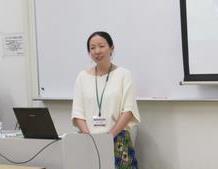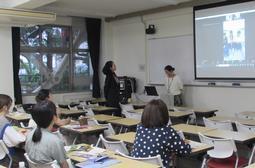- Global Collaboration Center
- Activity
- The report on 29th SDGs Seminar "Turning the experience of regional revitalization into international cooperation ~The challenge of Ama Town, a region with developed issues~" (Jun.2023)
ページの本文です。
The report on 29th SDGs Seminar "Turning the experience of regional revitalization into international cooperation ~The challenge of Ama Town, a region with developed issues~" (Jun.2023)
2024年5月1日更新
The 29th Sustainable Development Goals (SDGs) Seminar, titled "Turning the experience of regional revitalization into international cooperation ~The challenge of Ama Town, a region with developed issues~" was held on June 6, 2023. We invited Ms. Toko Morita as a lecturer. She is seconded by JICA and currently works as an international cooperation coordinator in Ama Town, located in the Oki Islands, a remote island in Shimane Prefecture.
In this seminar, she talked about her background, including her arrival in Ama Town, as well as and its regional revitalization projects and international cooperation efforts.
Ms. Morita said that she started working in the field of international cooperation after graduating from Trent University in Canada with a degree in International Relations. Her experience includes working at the OWF Secretariat of the NPO Kansai Council of International Exchange Organizations and the JICA Kenya Office. There, she supported the activities of the Japan Overseas Cooperation Volunteers. However, due to the effects of the COVID-19 pandemic, she returned to Japan and moved with her family to Ama Town, where she began her role as an international cooperation coordinator for JICA.
Ama Town is one of the Oki Islands and is famous as a place where Emperor Go-Toba was exiled. The island is located about 60 km off the mainland and is home to approximately 2,300 residents. Processed food must be brought in by boat from the mainland, but agriculture, fishing, and livestock farming are thriving, making life on the island virtually self-sufficient. Ms. Morita shared a story about how, when the sea is rough and the ship cannot sail, bread and milk run out, causing people to start to store them. However, hearing about Ama Town, which is filled with a type of affluence that is not necessarily comfortable, makes me reflect on how Tokyo may not be as rich as it seems.
Ms. Morita described Ama Town as a " a region with future issues," including population outflow, a declining birthrate, an aging population, and a fiscal crisis. To address these challenges, the residents of Ama Town have been engaged in regional revitalization efforts under the motto “nai-mono-wa-nai,” which suggests that everything they need to live is available there. This motto carries a dual meaning: the town is (1) inconvenient, yet (2) provides all the essentials for living, such as food and social connections. With this as a pivotal point, financial revitalization was initiated. The town mayor and municipal officials voluntarily cut their salaries, and local organizations and others came together to restore the island’s finances as a whole, in order to prevent the town from receiving government assistance and losing its freedom of self-government due to financial collapse.
Revitalization efforts included inviting ‘outsiders’ beyond the island to interact with one another and discover the island’s charms, which had often gone unnoticed by locals. Projects were implemented to make the most of Ama Town, such as the commercialization of turban shell curry. Additionally, as part of the "High School Attraction Project" on the island, the number of students increased from 30 to 180 by introducing student-led fieldwork exploration classes. Ama Town has also enhanced childcare support by covering the costs of transportation to off-island hospitals and providing midwifery services when needed. As a result of these efforts, Ama Town has succeeded in halting the outflow of population and revitalizing the region. Ama Town has a partnership agreement with JICA to provide training for human resources in developing countries who will be responsible for nation-building. This includes a Glocal Program designed as a training initiative for JICA Overseas Cooperation Volunteers, as well as grassroots technical cooperation conducted by high schools in Bhutan and Ama Town. During the seminar, we were able to connect with the trainees of the Glocal Program online and listen to their stories.
Through this SDGs seminar, I learned that regional revitalization is closely related to connecting with people and utilizing regional characteristics. It is important to have someone you can rely on by your side and to unite the entire community towards a common goal. We need to discover what exists in the region—its history, culture, local character, and personality—and use these elements to promote the area. This can be achieved even when resources such as money, goods, and people are in short supply. Furthermore, this concept is closely linked to the field of international cooperation in nation-building. These are the insights I gained from the seminar. I felt a desire to find connections and awareness in seemingly unrelated areas. I hope to visit Ama Town someday.
(Koharu Suzuki, freshman student, Department of Languages and Culture, Faculty of Letters and Education)












